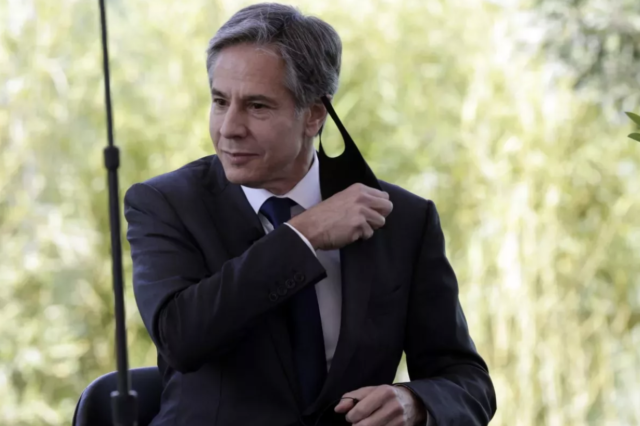
Who should worry about the Biden administration’s foreign policy choices? It depends. If you are a long-term friend of the United States or aligned with American interests abroad or a democracy in a dangerous neighborhood, you should worry. But if you are a threatening menace to mankind, not so much.
In less than a year, the administration has shown itself to be wedded to internationalism, international institutions and international funding, bribery, and a belief that talking plus concessions will change the deeply embedded beliefs of authoritarian and communist countries.
This is not your father’s isolationism—although the devastating withdrawal from Afghanistan was a thoroughly isolationist move. Regardless of how one thought the U.S. presence in that country should go forward—in or out—abandoning allies and weapons to the Taliban without notice was horrifying.
On Iran, it has been Biden policy to have Tehran return to the terms of the 2015 nuclear deal. In one sentence, retired Israeli diplomat Yoram Ettinger encapsulated the Biden position in the Persian Gulf to that end, noting, “In February 2021, the U.S. removed Yemen’s Shite Houthis—who are Iran’s proxy—from the list of terrorist organizations, courted Iran’s rogue Ayatollahs, terminated U.S. support of the pro-U.S. Saudi military offensive against the anti-U.S. Houthis and pressured Saudi Arabia on account of human rights violations.”
In the absence of protections for Saudi citizens and facilities, the Houthis have increased their attacks on Riyadh. The irony? The latest attacks come precisely as President Joe Biden complained that Saudi Arabia and other OPEC members aren’t producing enough oil. And in November, Houthis stormed the U.S. embassy in Sanaa, holding local staff hostage.
Also in November, the U.S. waived sanctions on Iran to allow the regime to sell electricity to Iraq, providing economic relief to Iran and undermining the Iraqi government, which is trying to minimize the influence of Iran and its Shiite militias.
Israel has been forced to create daylight with the United States on Iran by announcing that it would protect its citizens by taking independent steps, if necessary, to prevent Tehran from acquiring nuclear weapons. This is daylight in addition to that created by the Biden administration’s announcement that it wanted to open a U.S. consulate to the Palestinian Authority (PA) in Israel’s capital city, Jerusalem.
The PA, on the other hand, has benefited financially from the Biden administration. The bipartisan Taylor Force Act prohibits U.S. aid to the PA as long as it pays “salaries” to Palestinians convicted of terror attacks against Israel (or to the terrorists’ families). But despite the PA insisting it would, and does, pay such stipends, the administration announced it would provide $235 million in U.S. aid to the PA and favors a return to the “two-state solution” framework that prioritizes Palestinian statehood over the Abraham Accords.
Lebanon, ruled by U.S.-designated terror organization Hezbollah, will likely be receiving natural gas in a U.S.-brokered deal that will also benefit Syria.
Climate drives the administration’s relations with China. While appropriately concerned with Chinese infringement on Taiwan and looking for closer coordination with our regional allies, the issue of the Uyghur population of Xinjiang—formerly deemed a “genocide” by Secretary of State Antony Blinken—has received short shrift. Asked whether he had raised the issue in China, “climate czar” John Kerry said, “Life is full of tough choices,” and that his was climate change. China responded by announcing plans to build 43 new coal-fired power plants.
The Uyghurs can take scant comfort from the administration’s announced diplomatic boycott of the February Olympics in Beijing. According to The Washington Post, the administration told Senate Democrats that the Uyghur Forced Labor Prevention Act was “undesirable.” The bill, among other things, would make American importers prove that goods obtained in Xinjiang—where the genocide is being conducted—were not made with forced labor.
Russia is amassing troops on the border of Ukraine and slowing/cutting the supply of natural gas to Europe, even as the Nord Stream 2 pipeline nears completion after Biden waived U.S. sanctions on its construction.
One more?
An oddball: The administration supported Tigray rebels—not the government of Ethiopia, a traditional friend of the United States and Israel alike. Why it did so is unclear, but the Ethiopian government appears to have pushed back the threat with help from China and Iran. The Washington Post, generally friendly to the Biden administration, contributed to the conversation by reporting that American Ethiopians voted heavily Republican in the Virginia off-year election. The Post seemed surprised.
It should not have been.





